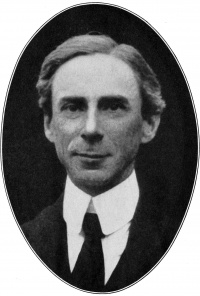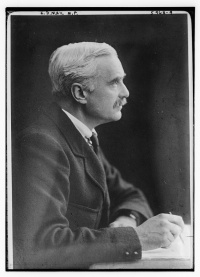Foundation and Membership↑
The Union of Democratic Control (UDC) was a British pressure group, created in August 1914, which called for greater public scrutiny and control of diplomacy. Its founders were:
- Sir Charles Trevelyan (1870-1958), who resigned as a junior minister in the Liberal government upon Britain’s declaration of war against Germany;
- Edmund Dene Morel (1873-1924), a political activist noted for his campaign against Belgian control of the Congo;
- James Ramsay MacDonald (1866-1937), who resigned as Labour Party chairman when his colleagues endorsed war credits;
- Arthur Ponsonby (1871-1946), a prominent pre-war Liberal critic of foreign policy;
- Ralph Norman Angell (1872-1967), author of The Great Illusion, which argued that Europe’s interconnected economies rendered a European war worthless.
Other prominent members included several Liberal and Labour MPs, the economist John Atkinson Hobson (1858-1940), the philosopher Bertrand Russell (1872-1970) and Helena Swanwick (1864-1939), who wrote its first major history. Besides local UDC branches, the UDC affiliated with numerous labour organisations and women’s groups, declaring its support for "equal citizenship" between men and women.
Aims and Principles↑
The UDC declared its four “Cardinal Points” on 10 September 1914:
- Affected populations should be consulted by plebiscite before transferring sovereignty of any area from one state to another.
- “Secret diplomacy” should be replaced by public parliamentary sanction for all British foreign policy.
- Foreign policy should seek international cooperation rather than the “balance of power”. An “international council” should be established to ensure peace.
- Britain should advocate substantial international disarmament and nationalised armaments production.
Extending Point three, the UDC member Goldsworthy Lowes-Dickinson (1862-1932) soon coined the term “league of nations”, and he and several other members were active in the “Bryce Group”, which developed the idea further. The UDC claimed that U.S. President Woodrow Wilson’s (1856-1924) later advocacy of the League of Nations, and other aspects of his Fourteen Points, were influenced by their ideas.
Leaders of Dissent↑
The UDC was (with the Independent Labour Party, with which it shared close connections) the most prominent dissenting organisation in wartime Britain. Its extensive propaganda and voice in Parliament as a small opposition group made it a target for hostility and suspicion. It was considered a “pacifist” organisation, accused of being pro-German and even investigated for German funding, though no evidence of this was found. As tolerance of dissent and criticism declined, the UDC and its members were exposed to increasing official and public pressure. Its secretary, Morel, was imprisoned for six months from August 1917 for violating the Defence of the Realm Act. Around the same time, the semi-official National War Aims Committee was formed and soon given access to police information about "pacifist" meetings and publications so that it could respond with its own propaganda.
Domestic Political Impact↑
Although UDC-affiliated MPs lost their seats in the 1918 election, the organisation continued until the 1960s. Historian Marvin Swartz considered it a crucial conduit for Liberal politicians into the post-war Labour Party. Its co-founder, MacDonald, became the first Labour prime minister in 1924, and Trevelyan, Ponsonby and twelve other UDC members became ministers in his government.
David Monger, University of Canterbury
Section Editor: Catriona Pennell
Selected Bibliography
- Hanak, Harry: The Union of Democratic Control during the First World War, in: Bulletin of the Institute of Historical Research 36, 1963, pp. 168-180.
- Harris, Sally: Out of control. British foreign policy and the Union of Democratic Control, 1914-1918, Hull 1996: University of Hull Press.
- Millman, Brock: Managing domestic dissent in First World War Britain, London; Portland 2000: Frank Cass.
- Swanwick, Helena Maria Lucy: Builders of peace. Being ten years' history of the Union of Democratic Control, London 1924: Swarthmore Press.
- Swartz, Marvin: The Union of Democratic Control in British politics during the First World War, Oxford 1971: Clarendon Press.










